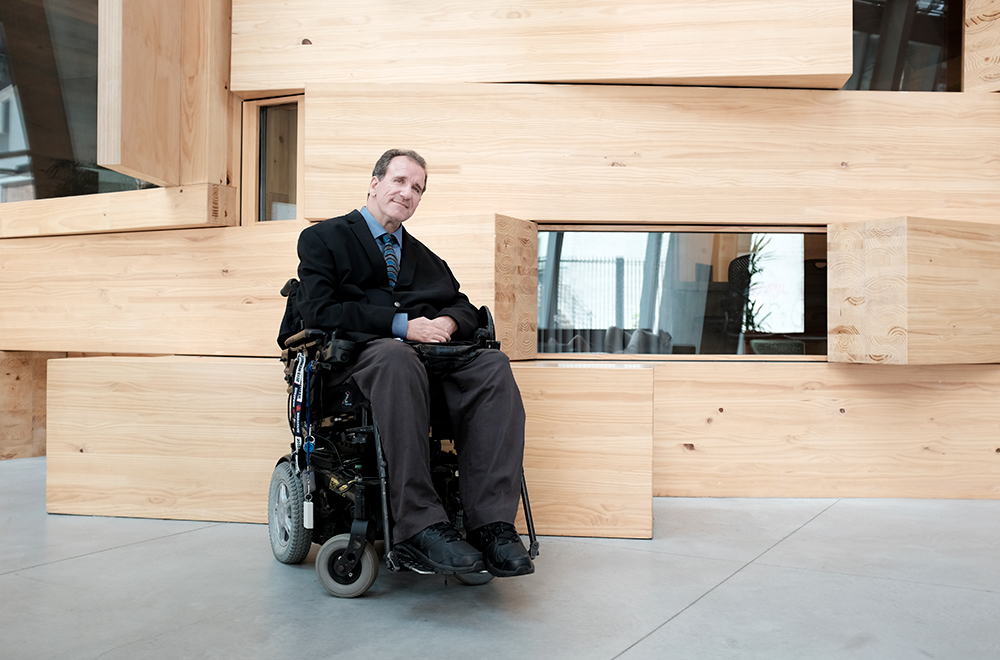A report from the UTS Business School found that for some people with disability, self-employment and entrepreneurship isn’t an option, it’s a necessity.
While there’s been little research on self-employment and entrepreneurship done in Australia, there is a rising awareness that people with disability’s aspirations and needs simply aren’t being met, particularly in terms of traditional employment models, report co-author, and Professor of Management at UTS Business School, Simon Darcy, pictured, said.
“A lot of people feel disgruntled because they face blocks to getting a job they want, progressing their career, and, given the discriminatory stereotypes and attitudes toward disability out there, often getting a job in the first place.” He said people were passionate about their business ideas and were attracted by the opportunity to play out their vision, be their own boss and do work that was flexible to their needs.
However, raising awareness within government that entrepreneurship is a viable option is also a big driver and was starting to pay dividends. As a result of advocacy from industry partners arising from the study, the National Disability Insurance Agency (NDIA) has recognised self-employment as a valued new area of engagement within the NDIS.
In June last year at the National Disability Services employment summit Darcy questioned the NDIA about self-employment, micro-enterprise and entrepreneurship as part of plan supports. “I was told unequivocally participants can and should have education and employment goals built into their plans. I responded that this needs to get out to the planners because people are regularly being refused the inclusion of supports for these reasons,” he told F2L.
In January the NDIA published the participant employment strategy that did two things:
Recognised self-employment, micro-finance and entrepreneurship within the document; and put a metric on improving the employment rates of participants from a current 25 per cent to 33 per cent by 2023 – https://www.ndis.gov.au/about-us/strategies/participant-employment-strategy.
In the last round of the ILC capacity building grants some six micro-enterprise, self-employment or entrepreneurial programs were funded.
Asked about the impact of coronavirus Darcy told F2L… “Anecdotally people with disability have been winners and losers in the self-employment stakes, depending on what their businesses do, but at this point I cannot qualify that as I don’t think anyone can.”
The study, the first of its kind in Australia, is aimed at tackling these issues head-on, NDS head of employment, Kerrie Langford said: “The spectrum of employment supports for people with disability needs to expand to enable the entrepreneurial spirit and innovation this ground-breaking research revealed.
“If we are to shift consistently poor employment outcomes for people with disability in Australia, then options such as inclusive start up support, business incubators tailored to the specific needs of people with disability, and evidenced based programs for school leavers should all be priorities for investment,” she said.
Many people with disability interviewed for the report found it made sense to work for themselves rather than hit their heads against a ‘brick wall’ of negative misconceptions. They also set up their own business because disability can make it impractical to work standard hours in a standard office setup as transport and commuting are significant structural and economic barriers, particularly where reliance on taxi or wheelchair accessible taxis are needed.
Whatever the motivation, self-employment or entrepreneurship was a popular work choice. ABS data showed people with disability are, on average, more than 40 per cent more likely to be self-employed than their non-disability counterparts.
This has serious implications for how employment services are provided to this group by the private sector, not-for-profit and government agencies. In particular, the study found there were complications in incorporating educational opportunities for self-employment or supports required under the NDIS.
It also has repercussions for how Australia’s system of new business accelerators and incubators deliver their services in a way that is inclusive to the group, whether that be providing education, funding, mentorship or networking opportunities. Without a big rethink on how these services can be more inclusive, many could miss out.
“We’re working hard to plug people in, to get our findings out there in front of decision-makers and to make sure government, employers, Chambers of Commerce and the mainstream Australian start-up community understand people with disability need support from their programs,” Darcy said. “You need to make them inclusive.”
Most businesses don’t cater for employees with disability, and self-employment could offer an alternative, but the current system is short on inclusive programs, mentors, tailored networks and educational opportunities. Government agencies and current models of disability employment services are also less likely to consider self-employment a viable option for clients with disability.
Programs designed to facilitate business creation, such as SSI’s Ignite and IgniteAbility Small Business Start-ups, can help achieve independence and a sense of inclusion.
The project was assisted by National Disability Services, BreakThru People Solutions and Settlement Services International.
For more details go to: Entrepreneurs with Disability report

